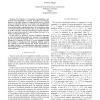34 search results - page 3 / 7 » Polynomial datapath optimization using constraint solving an... |
AAAI
2010
13 years 8 months ago
2010
Multi-Agent Plan Recognition (MAPR) seeks to identify the dynamic team structures and team behaviors from the observations of the activity-sequences of a set of intelligent agents...
ICCV
2009
IEEE
15 years 10 days ago
2009
IEEE
Supervised learning of a parts-based model can be for-
mulated as an optimization problem with a large (exponen-
tial in the number of parts) set of constraints. We show how
thi...
BIS
2008
13 years 8 months ago
2008
The deep Web has many challenges to be solved. Among them is schema matching. In this paper, we build a conceptual connection between the schema matching problem SMP and the fuzzy ...
IEEECIT
2010
IEEE
13 years 5 months ago
2010
IEEE
—The relevance of instruction parallelization and optimal event scheduling is currently increasing. In particular, because of the high amount of computational power available tod...
CP
1998
Springer
13 years 11 months ago
1998
Springer
The constraint paradigm provides powerful concepts to represent and solve different kinds of planning problems, e. g. factory scheduling. Factory scheduling is a demanding optimiz...

